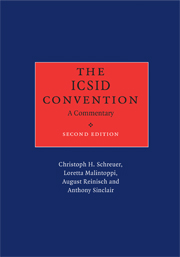Book contents
- Frontmatter
- Contents
- Foreword by Professor Sir Elihu Lauterpacht, CBE, QC
- Authors' preface to the second edition
- Table of cases
- List of abbreviations
- Text of the ICSID Convention
- Procedural calendar
- PREAMBLE
- CHAPTER I International Centre for Settlement of Investment Disputes
- CHAPTER II Jurisdiction of the Centre
- CHAPTER III Conciliation
- CHAPTER IV Arbitration
- Article 36 Request for Arbitration
- Article 37 Composition of Tribunal
- Article 38 Appointment by Chairman
- Article 39 Nationality of Arbitrators
- Article 40 Qualities of Arbitrators
- Article 41 Decision on Jurisdiction
- Article 42 Applicable Law
- Article 43 Evidence
- Article 44 Rules on Procedure
- Article 45 Default of a Party
- Article 46 Ancillary Claims
- Article 47 Provisional Measures
- Article 48 Award
- Article 49 Dispatch, Supplementation and Rectification
- Article 50 Interpretation
- Article 51 Revision
- Article 52 Annulment
- Article 53 Binding Force
- Article 54 Enforcement
- Article 55 State Immunity
- CHAPTER V Replacement and Disqualification of Conciliators and Arbitrators
- CHAPTER VI Cost of Proceedings
- CHAPTER VII Place of Proceedings
- CHAPTER VIII Disputes between Contracting States
- CHAPTER IX Amendment
- CHAPTER X Final Provisions
- Final Clause
- Consolidated bibliography
- Index by article
- Index by subject
Article 55 - State Immunity
from CHAPTER IV - Arbitration
Published online by Cambridge University Press: 07 September 2010
- Frontmatter
- Contents
- Foreword by Professor Sir Elihu Lauterpacht, CBE, QC
- Authors' preface to the second edition
- Table of cases
- List of abbreviations
- Text of the ICSID Convention
- Procedural calendar
- PREAMBLE
- CHAPTER I International Centre for Settlement of Investment Disputes
- CHAPTER II Jurisdiction of the Centre
- CHAPTER III Conciliation
- CHAPTER IV Arbitration
- Article 36 Request for Arbitration
- Article 37 Composition of Tribunal
- Article 38 Appointment by Chairman
- Article 39 Nationality of Arbitrators
- Article 40 Qualities of Arbitrators
- Article 41 Decision on Jurisdiction
- Article 42 Applicable Law
- Article 43 Evidence
- Article 44 Rules on Procedure
- Article 45 Default of a Party
- Article 46 Ancillary Claims
- Article 47 Provisional Measures
- Article 48 Award
- Article 49 Dispatch, Supplementation and Rectification
- Article 50 Interpretation
- Article 51 Revision
- Article 52 Annulment
- Article 53 Binding Force
- Article 54 Enforcement
- Article 55 State Immunity
- CHAPTER V Replacement and Disqualification of Conciliators and Arbitrators
- CHAPTER VI Cost of Proceedings
- CHAPTER VII Place of Proceedings
- CHAPTER VIII Disputes between Contracting States
- CHAPTER IX Amendment
- CHAPTER X Final Provisions
- Final Clause
- Consolidated bibliography
- Index by article
- Index by subject
Summary
INTRODUCTION
Art. 55, by its own terms, is an interpretation of Art. 54. It provides a clarification to Art. 54(3) which states that execution of an award is governed by the law of the State in which execution is sought. This law includes the law on State immunity.
It also provides a clarification to the provision in Art. 54(1) which requires the enforcement of the pecuniary obligations under an ICSID award as if the award were a final judgment of a local court. The reference to “judgments in force” in Art. 54(3) has the same meaning. State immunity will apply to the execution of an ICSID award in the same way as it would apply to the execution of a judgment of a domestic court.
The drafting history of Art. 55 reveals no controversy. The earlier drafts did not include a provision on State immunity (History, Vol. I, p. 254). Noncompliance by a State with an award was regarded as extremely unlikely (History, Vol. II, p. 520; see also Art. 54, para. 7). The preservation of State immunity was taken for granted (at pp. 176/7, 242, 304, 346, 372, 379, 424, 426, 429, 430, 464/5, 575). The text of what became Art. 55 was inserted into the First Draft merely to clarify this point (at pp. 343, 428, 575, 905, 989).
- Type
- Chapter
- Information
- The ICSID ConventionA Commentary, pp. 1151 - 1185Publisher: Cambridge University PressPrint publication year: 2009



